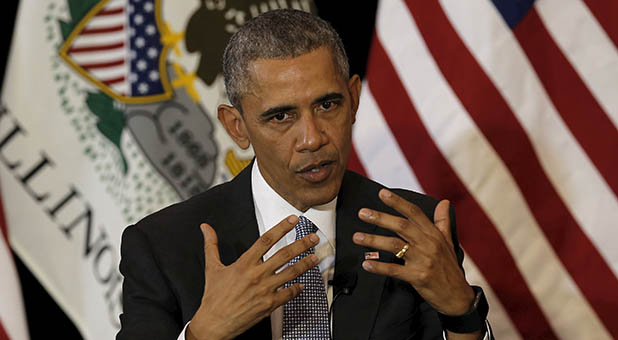Senator Finds Irony in President Obama’s Supreme Court Comments
At least one person found some irony in President Obama’s recent speech at the University of Chicago law school.
Senate Judiciary Committee Chairman Chuck Grassley (R-Iowa) took to the Senate floor Tuesday to point it out for his colleagues. The key point: they both agree the high court has become politicized.
“‘I think, just from reading the cases, you’ll acknowledge that there’s politics in legal rulings,'” Grassley said. “That’s what President Obama said last week when he visited the University of Chicago.
“The President met with law students and answered their questions. They asked him about judicial nominations, including his decision to make a nomination to fill Justice Scalia’s seat on the Supreme Court.
“His responses were revealing.
“I agree with President Obama that too often politics seep into legal rulings. He’s right as a factual matter. In fact I said the same thing on the Senate floor a few days before the President did.
“Oddly, those on the left who were up in arms over my remarks were silent on the President’s. I suppose that’s because, unlike the President, I think it’s a bad thing that there’s politics in judicial decision-making these days.”
Grassley said politics in judicial opinions means that “something other than law” forms the basis of those decisions. It means the jurist is “reading his or her own views into the Constitution,” which he has repeatedly said is the biggest threat to public confidence in the court system.
He expounded on those views Tuesday:
“The President’s idea of what’s appropriate for justices to consider is totally at odds with our constitutional system. We are a government of laws and not a government of judges.
“I’ve said before that we should have a serious public discussion about what the Constitution means and how our judges should interpret it. President Obama and I have very different views on those questions.
“Politics belongs to us—it’s between the people and their elected representatives. It’s important that judges don’t get involved in politics. That’s because, unlike senators, lifetime-appointed federal judges aren’t accountable to the people in elections.
“It’s also because when nine unelected justices make decisions based on their own policy preferences, rather than constitutional text, they rob from the American people the ability to govern themselves. And when that happens, individual liberty pays the price …
“James Madison—the Father of the Constitution—explained the same thing in a letter to Richard Henry Lee. He said that ‘the sense,’ or meaning, ‘in which the Constitution was accepted and ratified by the nation’ defines the Constitution.
“He said that’s the only way the Constitution is legitimate. That’s because, in Madison’s words, ‘if the meaning of the text be sought in the changeable meaning of the words composing it,’ the ‘shape and attributes’ of government would change over time.
“And importantly, that change would occur without the people’s consent. It wouldn’t be consistent with the way we govern ourselves through our representatives. That’s a very different view than the President suggested in Chicago last week when he said that ambiguous cases ask a judge to consider ‘how we actually live.’
“In President Obama’s view, the judge isn’t asking what a law meant when it was passed, but what it should mean today. President Obama described this as his ‘Progressive view of how the courts should operate.’ With respect to the President, it’s my view that the courts shouldn’t operate in a political way at all.
“Not a progressive one, not a moderate one, not a conservative one.
“Instead, in my view, the courts should operate in a constitutional way that ensures government by the people.”















































